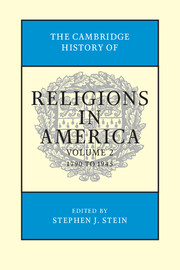Book contents
- Frontmatter
- Contents
- Contributors
- Editor's Introduction
- SECTION I RELIGION IN NORTH AMERICA
- SECTION II RELIGIONS IN THE NEW NATION, 1790–1865
- SECTION III CHANGING RELIGIOUS REALITIES
- 11 Diversity, Revival, Rivalry, and Reform: Protestant Christianity in the United States, 1800–1950
- 12 American Catholics, 1800–1950
- 13 American Judaism, 1820–1945
- 14 Formation and Consolidation of African American Religious Communities, 1865–1945
- 15 Eastern Orthodox Christianity in America
- 16 New Religious Movements
- 17 American Indian Religions in America, 1790–1945
- 18 Why Muslims Matter to American Religious History, 1730–1945
- 19 Asian Religions in the United States: The Role of the 1893 World’s Parliament of Religions in Shaping an Evolving Pluralist Ideology
- 20 Metaphysical Movements
- SECTION IV RELIGIOUS RESPONSES TO MODERN LIFE AND THOUGHT
- SECTION V COMPARATIVE ESSAYS
- SECTION VI RELIGION AND DIVERSE AREAS
- Index
- References
12 - American Catholics, 1800–1950
from SECTION III - CHANGING RELIGIOUS REALITIES
Published online by Cambridge University Press: 28 July 2012
- Frontmatter
- Contents
- Contributors
- Editor's Introduction
- SECTION I RELIGION IN NORTH AMERICA
- SECTION II RELIGIONS IN THE NEW NATION, 1790–1865
- SECTION III CHANGING RELIGIOUS REALITIES
- 11 Diversity, Revival, Rivalry, and Reform: Protestant Christianity in the United States, 1800–1950
- 12 American Catholics, 1800–1950
- 13 American Judaism, 1820–1945
- 14 Formation and Consolidation of African American Religious Communities, 1865–1945
- 15 Eastern Orthodox Christianity in America
- 16 New Religious Movements
- 17 American Indian Religions in America, 1790–1945
- 18 Why Muslims Matter to American Religious History, 1730–1945
- 19 Asian Religions in the United States: The Role of the 1893 World’s Parliament of Religions in Shaping an Evolving Pluralist Ideology
- 20 Metaphysical Movements
- SECTION IV RELIGIOUS RESPONSES TO MODERN LIFE AND THOUGHT
- SECTION V COMPARATIVE ESSAYS
- SECTION VI RELIGION AND DIVERSE AREAS
- Index
- References
Summary
From the founding of the first diocese in the United States in Baltimore in 1789 with only a few thousand Catholics, the population of Catholics grew rapidly until in 1850 Catholics made up the largest denomination in the United States. By 1962, Americans had elected a Catholic, John F. Kennedy, president of the United States. The nineteenth century and the first half of the twentieth century proved to be a time of growth yet marginalization for American Catholics. Catholics came to the United States from Europe in large numbers, creating immigrant ethnic church communities all over the country. There were Irish, Italian, and French Catholics in the Northeast, German and Polish Catholics in the Midwest, and Mexican and Latin American Catholics in the Southeast, Southwest, and West. They had all come as immigrants, putting them on the bottom economic and social rung of society. Being Catholic made them double outsiders in a society dominated by Protestants who had founded the country.
On 6 November 1789, Pope Pius VI appointed John Carroll the first bishop in the United States and established the Diocese of Baltimore, Maryland. When Carroll took office, only one church served the entire region. According to reports sent to Rome in 1780, Maryland was home to sixteen thousand Catholics served by only nineteen priests. By 1790 the entire United States counted only forty thousand Catholics among its citizens, fewer than 1 percent of the population.
- Type
- Chapter
- Information
- The Cambridge History of Religions in America , pp. 251 - 272Publisher: Cambridge University PressPrint publication year: 2000

